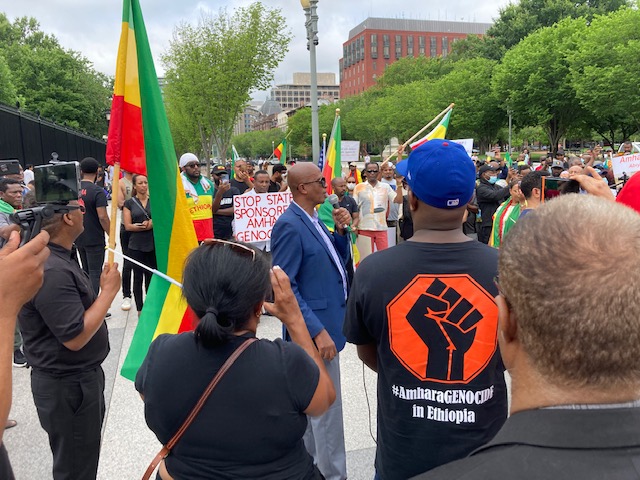Atrocities continue unchecked
The situation in Ethiopia is worsening. The government of Abiy Ahmed Ali has failed to protect innocent Amhara civilians. In Wollega Province, the Oromo Liberation Army, cooperating with government officials, has continued killing innocent Amharas.
Ethiopian-Americans have contacted the Human Rights office of the United Nations in New York and Geneva to report the atrocities and genocide and to request that the UN conduct an independent investigation of the massacre of the innocent Amhara civilians in Wollega.
Ethiopian-Americans demonstrated in front of the White House last week to denounce the Abiy government’s failure to maintain the rule of law and protect the lives of Ethiopians. The guest speaker was Eskinder Nega, Human Rights activist and president of Balderas for True Democracy in Ethiopia. The Abiy government has not made any attempts to hold those responsible for the massacres of the Amhara people accountable, nor has it acted against the OLF/Shenne group, which has committed atrocities and destroyed property in Wollega province.

The TPLF has committed atrocities with impunity in the Afar region, including killing innocent civilians and destroying hospitals, schools, mosques, and churches.
The Ethiopian-American Community has asked the UN Security Council to send UN Peacekeepers to Wollega, warning that international action is needed to prevent a genocide that could resemble the Rwandan genocide of 1994.
Letter to UN
In a letter to the UN Secretary-General, I expressed the concerns of Ethiopian-Americans, the Ethiopian diaspora, and friends of Ethiopia residing in the US and throughout the world about the ongoing civil war in their country and the possibility of even greater loss of life. The letter noted the Abiy government’s abdication of responsibility for the massacres of the Amhara people and its failure to act against the OLF/Shenne terrorists or to prevent the TPLF from committing atrocities.
The current tragedies in Oromia, Tigray, and throughout Ethiopia point to the urgent need for political change. The innocents who have been slaughtered cannot be brought back to life, but it is possible to act to prevent an even larger-scale catastrophe. The international community must support creating a transitional government that includes peaceful opposition members and civic and religious leaders. The transitional government must preside over the revision of the constitution, the formation of a new military representing the 13 provinces and regions of Ethiopia, and the formation of a committee for peace and reconciliation. All of these steps must be directed toward the goal of holding new free and fair elections in Ethiopia within a year.
Ethiopia Peace and Stabilization Act
The deterioration in security, threats to human rights, and the potential for a large-scale catastrophe have raised concerns in the US Congress. On March 29, the Senate Foreign Relations Committee unanimously passed the Ethiopia Peace and Stabilization Act. The bill was originally drafted in response to the war in Tigray, but it is relevant to the widening crisis. “The conflict in Ethiopia has shifted since we first introduced this important bill, but the core issues remain the same. This bill provides the tools to hold all parties to this conflict accountable for the many atrocities committed and a deadly humanitarian crisis. This legislation also focuses on the role of disinformation and foreign actors in this war, which have increased its lethality and persistence,” the ranking Republican on the committee, Sen. Jim Risch (R-Idaho), said.
The committee chairman, Sen. Bob Menendez (D-N.J.), said that in passing the bill, “we not only shine a light on the extra-judicial killings, mass sexual and gender-based violence, forced displacement, and civilian humanitarian aid blockades as being used as weapons of this war, but we also take a big step to end these atrocities by setting up a policy framework that calls for a determination by the Secretary of State related to war crimes, crimes against humanity and genocide, a critical element in holding perpetrators accountable. With the ongoing diplomatic work and the dynamic situation on the ground in Ethiopia, I’m proud to see the US Senate act to provide maximum leverage to our diplomats to hold the parties’ feet to the fire on engaging in good faith negotiations leading to a sustainable peace.”

Mesfin Mekonen
Mesfin Mekonen is the author of Washington Update, a bulletin about Ethiopia’s struggle for freedom and prosperity, and founder of MM Management.









